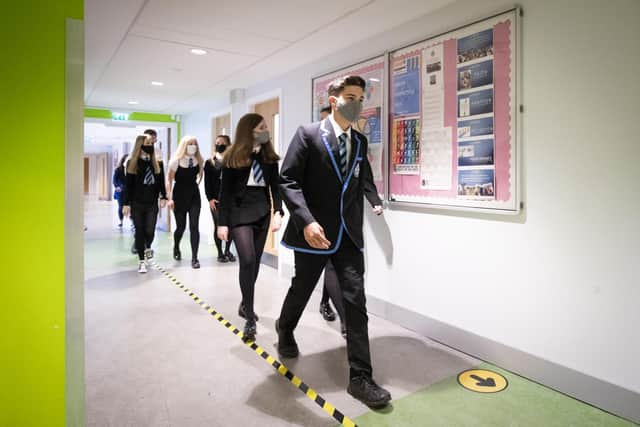SQA: Historical Scottish school performance data was not part of 'alternative assessment' model
Speaking to MSPs at the Scottish Parliament’s Education Committee, SQA chief executive Dr Fiona Robertson also said that she believed Scotland’s assessment system had moved back towards exams after the Scottish Government scrapped unitised assessment in 2016. The OECD report recommended that Scotland should move away from exams-focused assessment towards other forms of assessment such as coursework.
Meanwhile, SQA director of qualifications development, Dr Gill Stewart, admitted that a small schools were “a little bit off” in the quality of the grades they allocated and were given “supportive feedback” from the SQA. Pupils were told their provisional grades before the end of the summer term, to allow them to appeal if necessary.
Advertisement
Hide AdAdvertisement
Hide AdIn response to questions from MSPs, Dr Robertson said: “Did historic attainment in 2021 inform any moderation or any changes to grades? The answer is no. We weren’t looking at historic attainment when we were deciding what quality assurance we undertook.”


She added: “I think the Education Scotland report highlighted that in some cases, historical data is a way to ask a question, not to have another look at evidence.
“I think the discussions that we had on a number of occasions and the, including, which included around this issue was that young people, very important that learners should shoot receive grades on the basis of the evidence in front, in front of teachers. That evidence might be subject to quality assurance, that evidence might be subject to questions from the local authority - a whole range of approaches were put in place around providing assurance of the very consistency issue that you've that you've been very keen to stress.
“Results absolutely should be based on the evidence of demonstrated attainment and that is what was at the centre of the approach this year.”
She added: “It was not a model in which historic attainment played a part.”
The Scottish Government is to scrap the SQA and reform Education Scotland following a report into Scotland’s education system by the OECD earlier this year. There will also be reform of assessment structures, which is expected to take place after the current academic year.
Dr Robertson said: “I think the organisational structures that exist in Scottish education are important right across Scotland education, including the national bodies, but I think it's also important that considering what the constitution and structure of those bodies is, is that it's also important that we're clear about what it is we want, but it is we want those organisations to do.”
She added: “In the 2014 to 2016 period in which there was a balance of continuous assessment through a unitised structure, which was continuously assessed in schools, alongside exams and coursework. Following the removal of units in 2016 by Scottish ministers, we have seen, we have seen a slight move back to a greater emphasis on on exams.
Advertisement
Hide AdAdvertisement
Hide Ad"I think a lot of good systems of education have a balanced approach across continuous assessment, external assessment in the form of exams or some form of external assessment, and other other forms of assessment, for example coursework.”
A message from the Editor:
Thank you for reading this article. We're more reliant on your support than ever as the shift in consumer habits brought about by Coronavirus impacts our advertisers.
If you haven't already, please consider supporting our trusted, fact-checked journalism by taking out a digital subscription.
Comments
Want to join the conversation? Please or to comment on this article.
